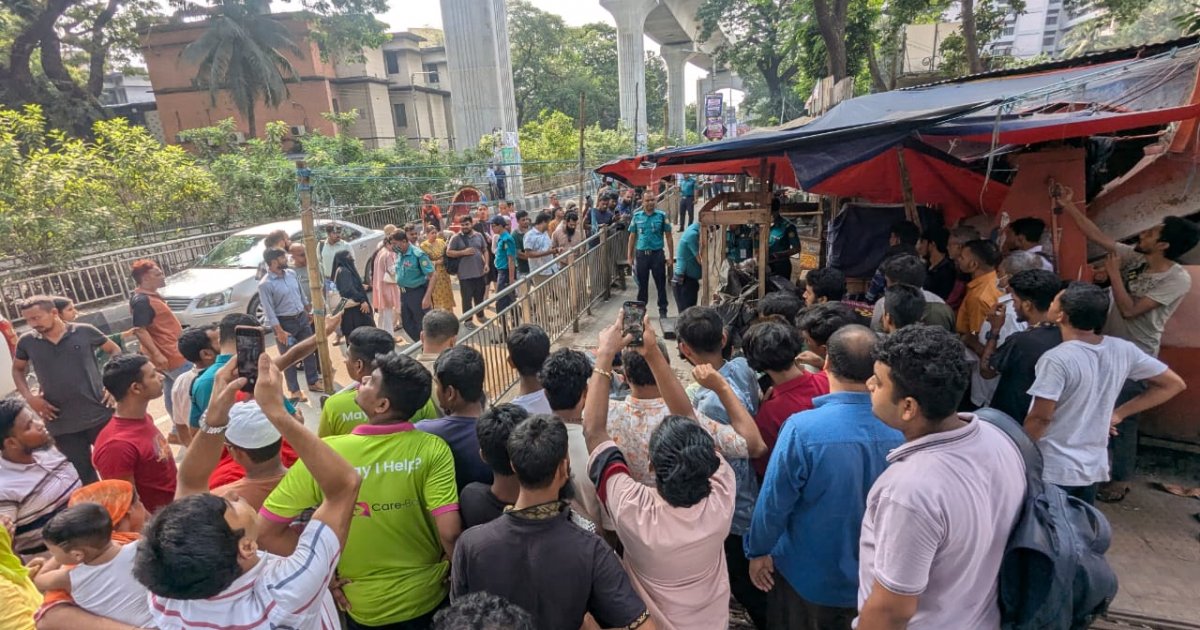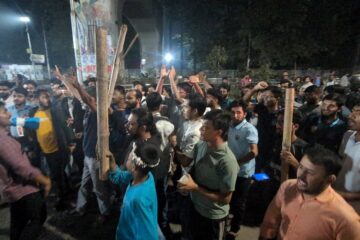A bearing pad from an elevated Dhaka metro rail pillar suddenly dislodged and plummeted onto a busy Farmgate sidewalk around 12 noon Sunday.
The 140–150kg rubber-and-steel pad struck a 35-year-old pedestrian, Abul Kalam, killing him on the spot, then smashed into a small tea stall, shattering its glass and injuring two other people.
Eyewitnesses described a loud bang and a shock wave through the area as the heavy pad “jumped” off the viaduct, hitting Kalam in the neck and causing him to collapse in seconds, bleeding from the nose and mouth.
The tea seller, Amir Ali, was among the injured and was rushed to a hospital for treatment.
Police quickly cordoned off the scene beneath Pier 433 near Farmgate Station, where the pad had fallen, and recovered Kalam’s belongings, including his passport.
Services halted and partial reopening
Metro rail operations were immediately suspended following the accident.
Dhaka Mass Transit Company Ltd (DMTCL) officials halted all trains on the 20-km Line-6, from Uttara to Motijheel, at 12:30pm as a safety precaution.
Stranded passengers were asked to leave stations, and notices citing a “technical fault” were posted, with authorities apologizing for the inconvenience.
The sudden closure caused immense commuter disruption, worsening Dhaka’s traffic as thousands sought alternative transport on already congested roads.
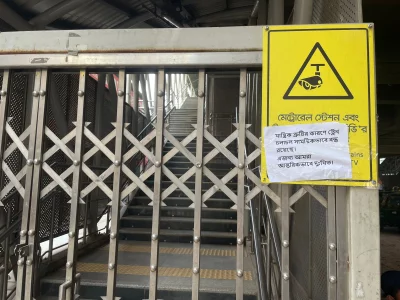
After a few hours, limited service resumed on the northern half of the route: trains began running again between Uttara and Agargaon from 3pm, once engineers isolated the affected span.
However, the downtown stretch through Farmgate toward Motijheel remained closed pending repairs and inspections, with officials unable to estimate a full reopening time.
DMTCL engineers brought in cranes and maintenance crews to the Farmgate site to replace the fallen pad and inspect the structure before restoring normal operations.
Probe committee formed
The government launched an investigation into the fatal failure.
Road transport adviser Muhammad Fouzul Kabir Khan visited the site and announced a five-member inquiry committee headed by Bridges Division Secretary Mohammad Abdur Rouf, tasked with determining whether the incident stemmed from sabotage or structural flaws.
Authorities also pledged support for the victim’s family.
DMTCL will cover funeral expenses and provide Tk5 lakh in financial aid to Kalam’s family.
If a capable family member is in need of employment, the metro rail authorities offered to provide a job placement in line with their qualifications.
“We will make all arrangements for the burial and support his dependents,” adviser Kabir said at the hospital, noting Kalam left behind a wife and two young children.
The tragic death has devastated Kalam’s relatives – an orphan who had worked hard to support his family – and raised public outcry for accountability.
Second such failure in 13 months
Sunday’s accident has heightened alarm over recurring safety lapses in the metro rail system.
It marks the second time in just over a year that a bearing pad has fallen off in the same vicinity.
On 18 September 2024, a similar pad dislodged near Farmgate (pier 430), fortunately causing no injuries, but it forced an emergency shutdown of the Agargaon–Motijheel segment for 11 hours.
That 2024 incident, occurring on a section where the line curves and changes elevation, had already raised serious questions among engineers and commuters about the metro’s structural safety.
Officials confirmed that Sunday’s fallen pad came from pillar number 433, just a few spans away from the site of last year’s mishap.
DMTCL’s Managing Director Md Faruque Ahmed said an internal technical team inspected every pier after the 2024 scare and implemented the previous probe committee’s recommendations.
“All necessary actions were taken as per the earlier report. Every pillar was physically checked by experts,” he added.
This claim, however, is now being questioned.
As he spoke at the scene on Sunday, adviser Kabir pointed at the broken pad in disbelief and asked: “Then how did this happen again?”
The DMTCL chief acknowledged the failure occurred within the project’s defect liability period, meaning the original contractor had “fixed” the issue at their own expense – or so they thought.
With history now repeating itself, the new committee will also review the previous investigation report to determine why earlier fixes fell short.
Design flaws and oversight
Structural experts suspect design shortcomings or oversight are to blame for these bearing pad incidents.
The metro viaduct’s design and construction supervision were led by a Japanese consortium (NKDM Association), generally known for high standards.
Yet the fact that heavy elastomeric pads, which are not bolted down but held in place by compression, could work loose and eject from under a girder is “highly unusual and alarming,” according to engineers.
“The bearing pad is essential for the structure’s stability and safety. If it falls off and kills someone, that suggests a possible design flaw,” said Prof Shamsul Hoque of Buet’s Civil Engineering Department.
He questioned whether the Japanese consultants accounted for the extra forces at track curves: “Any structure with such vibration and dynamic load should have an additional safeguard to prevent a pad from slipping out.”
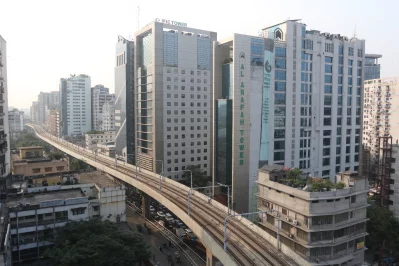
In the curved Farmgate section, the line transitions from a two-storey to a three-storey elevation, creating complex stresses.
While such curves are normal engineering challenges, Hoque said: “despite that, why should there be a security risk? It is unacceptable.”
He and others have called for an independent safety audit of the metro’s infrastructure, surprised that a Japanese-engineered system, typically “Six Sigma” reliable, has now seen multiple failures.
DMTCL officials have indicated they are exploring design modifications; after last year’s incident, the company said it would make special provisions in future lines to hold bearing pads securely in place.
The latest failure will put pressure on authorities to accelerate these design fixes on the existing line as well, to ensure no pad can slip out again.
Quality control
Further compounding concerns are revelations about quality control during construction.
As early as 2020, well before the metro’s launch, Buet engineers had flagged problems with the bearing pads being used on the project.
Laboratory tests at Buet’s Mechanical Engineering Department found that several pad samples “did not pass the test,” meaning they failed to meet the required specifications.
These elastomeric pads, supplied by Italian-Thai Development PLC (Ital-Thai) for the viaduct between Uttara and Agargaon (Project Packages 3 and 4), were found to be of substandard quality, prompting the import of replacement pads and delaying work.
In January 2020, the Road Transport and Highways Division formally inquired why Ital-Thai had provided faulty materials and what actions were taken as a result.
It was reported that by the time the issue came to light, about 8km of viaduct had already been installed with those initial pads.
Project officials claimed that later tests on those pads showed acceptable results, and no comprehensive recall was undertaken.
Instead, only the remaining uninstalled units were replaced “for safety reasons,” and the metro construction continued.
Now, critics are asking whether some inferior pads remained in place – and if the Farmgate pads that failed could have been among them, despite official assurances to the contrary.
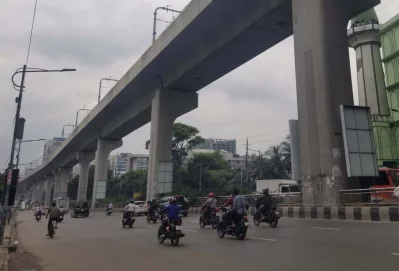
This incident also spotlights regulatory oversight of the metro system.
It has emerged that DMTCL has been operating the metro rail without a mandatory safety certification from the Dhaka Transport Coordination Authority (DTCA).
Despite legal requirements under the Metrorail Act 2015 for independent safety audits and regular safety reports, the operator has yet to submit a single safety report or obtain third-party certification since the metro opened in 2022.
Moreover, DMTCL failed to secure insurance coverage for the metro system and its passengers, as required by law.
Public trust
Sunday’s deadly accident has cast a pall over what was Bangladesh’s flagship modern transit project.
Launched in December 2022 amid much fanfare, the metro rail now carries about 450,000 passengers daily and has been celebrated for easing Dhaka’s notorious traffic jams.
Incidents like bearing pad failures, however, undermine public confidence in the system.
Crowds of onlookers gathered at Farmgate after the accident, many expressing anger and disbelief that a piece of the infrastructure could just fall off and kill someone.
Officials insist they are taking the matter seriously.
The investigation committee has begun work, including forensic analysis of the failed pad and a review of design data.
“We’ll investigate why the bearing pad fell and whether negligence or design faults were involved. Nothing is being ruled out,” DMTCL’s MD Faruque Ahmed told reporters.
In the meantime, engineers have installed a replacement pad at the site and conducted load tests before clearing partial operations to resume.
The damaged span will remain under close monitoring.
